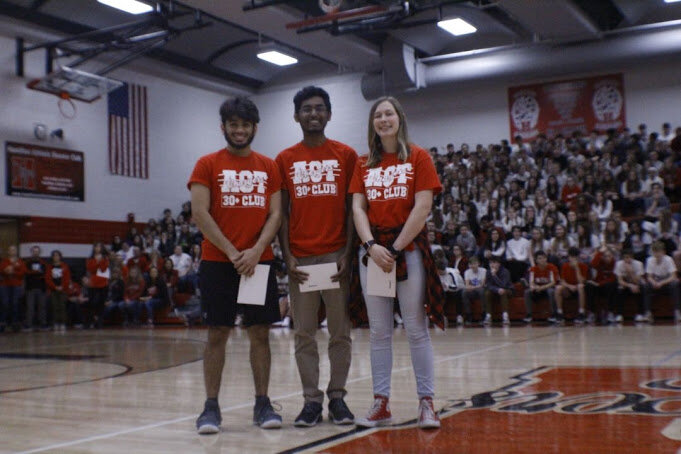Everyday Assumptions: First Philosophy Club Meeting
Students attending the first philosophy club meeting. Photo by Sarah Kowalske.
The Philosophy Club has resurged. After the club’s dissipation and hiatus for a few years, Mr. Daniel Krill, a math teacher, has revived it.
Around 15 years ago, Mr. Krill and a student, Rob Pothier, started the philosophy club with the prompting of the principal at the time, Mr. Furer. With student interest and Krill’s bachelor's degree in philosophy, they were the dynamic duo that would give rise to the first incarceration of the Philosophy Club. While the club dissipated after a few years, a seed remained in Mr. Krill’s thoughts to bring it back. On February 26, it returned with a total member count of 13 at the first meeting.
Philosophy means “love of wisdom.” There are several topics of philosophy: metaphysics, epistemology, ontology, ethics, politics, and aesthetics. When attendees at the first meeting were asked, there were many interpretations about what people thought philosophy was: asking questions without concrete answers or just going deeper in the tunnel.
Mr. Krill explained in the meeting that philosophy essentially is looking at something and saying, “How is that true?” He explained how truth diverges into aesthetics, covering each person's perception of beauty, practicality, and bliss, or how this works. The club’s purpose, to summarize briefly, is to encourage enlightenment through open conversation.
At the beginning of the meeting, a circle was formed, with each member introducing themselves and why they joined. Answers ranged from enlightenment to just being intrigued. Overall, it was a diverse crowd. Mr. Krill commented, saying, “We had a good turn out; people were respectful of conversation but open to sharing their thinking.”
In the first meeting, the club introduced the Believing and Doubting game (a metaphorical concept) - a game where people, when confronted with a controversial idea, go to two (figurative) camps, the doubting and believing based on their own beliefs and morals. In future meetings, Mr. Krill announced that the club will be the Believers and the Doubters, blowing ideas up and shooting them down.
In addition, the club digressed over a quote from Ayn Rand’s work Philosophy, Who Needs It:
You have no choice about the necessity to integrate your observations, your experiences, your knowledge into abstract ideas, i.e., into principles. Your only choice is whether these principles are true or false, whether they represent your conscious, rational convictions, or a grab-bag of notions snatched at random whose sources, validity and consequences you do not know, notions which more often than not, you would drop like a hot potato if you knew.
Essentially, Rand points out how much people have to assume day-to-day. Many students reacted to the realization of how much they assumed things and trusted their day to day activities and assumed that everything would go just how they thought it. Mr. Krill explained that you assume the floor could hold you up, but it could easily not. Just like within the movie The Matrix, reality can often throw off the disguise of your perceptions, revealing itself to be cold and deceiving in its appearance.
Regarding the future of the club, Mr. Krill comments, “I plan to collect information from all attendees so that future meetings are more customized to all club members' interests. I’m talking [about] movies, [or] field trips to hear philosophers speak and gain a perspective that otherwise would be impossible to gain. And lastly, every meeting is open to new members so feel free to come when the topic is of interest.”






